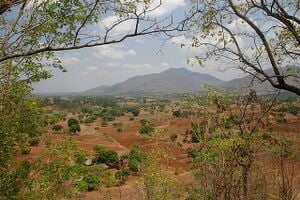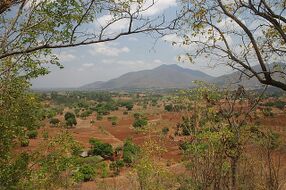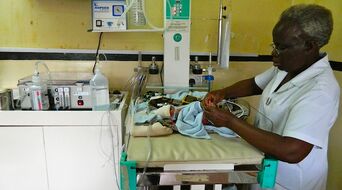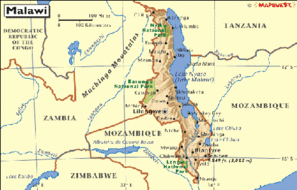
 Zimbabwe’s therapeutic ‘friendship benches’, coming to a city near you, positive.news (Jul 26, 2023)
Zimbabwe’s therapeutic ‘friendship benches’, coming to a city near you, positive.news (Jul 26, 2023)  Africa’s land and forest restoration initiative gathers pace in Malawi, news.mongabay.com (Jun 07, 2023)
Africa’s land and forest restoration initiative gathers pace in Malawi, news.mongabay.com (Jun 07, 2023)  Elephants on the Move: 250 Elephants to be Relocated in Malawi, African Parks (Jun 21, 2022)
Elephants on the Move: 250 Elephants to be Relocated in Malawi, African Parks (Jun 21, 2022)
Malawi (; lit. 'flames' in Chichewa and Chitumbuka), officially the Republic of Malawi and formerly known as Nyasaland, is a landlocked country in Southeastern Africa. It is bordered by Zambia to the west, Tanzania to the north and northeast, and Mozambique to the east, south and southwest. Malawi spans over 118,484 km2 (45,747 sq mi) and has an estimated population of 19,431,566 (as of January 2021). Malawi's capital and largest city is Lilongwe. Its second-largest is Blantyre, its third-largest is Mzuzu and its fourth-largest is its former capital, Zomba. It was the first capital city of Malawi before being changed to Lilongwe.
The part of Africa now known as Malawi was settled around the 10th century by migrating Bantu groups. Centuries later, in 1891, the area was colonised by the British as the British Central African Protectorate, and it was renamed as Nyasaland in 1907. In 1953, it became a protectorate within the semi-independent Federation of Rhodesia and Nyasaland. The Federation was dissolved in 1963. In 1964, the protectorate was ended: Nyasaland became an independent country as a Commonwealth realm under Prime Minister Hastings Banda, and was renamed Malawi. Two years later, Banda became president by converting the country into a one-party presidential republic. Banda was declared President for life in 1971, and Malawi's next few decades of independence were characterized by Banda's highly repressive dictatorship. Following the introduction of a multiparty system in 1993, Banda was defeated in the 1994 general election. Today, Malawi has a democratic, multi-party republic headed by an elected president and has continued to experience peaceful transitions of power. According to the 2024 V-Dem Democracy indices Malawi is ranked 74th electoral democracy worldwide and 11th electoral democracy in Africa. The country's military, the Malawian Defence Force, includes an army, a navy, and an air wing. Malawi's foreign policy is pro-Western. It maintains positive diplomatic relations with most countries, and participates in several international organisations, including the United Nations, the Commonwealth of Nations, the Southern African Development Community (SADC), the Common Market for Eastern and Southern Africa (COMESA), and the African Union (AU).
Malawi is one of the world's least-developed countries. The economy is heavily based on agriculture, and it has a largely rural and rapidly growing population. The Malawian government depends heavily on outside aid to meet its development needs, although the amount needed (and the aid offered) has decreased since 2000. The Malawian government faces challenges in its efforts to build and expand the economy, to improve education, healthcare, and environmental protection, and to become financially independent despite widespread unemployment. Since 2005, Malawi has developed several policies that focus on addressing these issues, and the country's outlook appears to be improving: key indicators of progress in the economy, education, and healthcare were seen in 2007 and 2008.
Malawi has a low life expectancy and high infant mortality. HIV/AIDS is highly prevalent, which both reduces the labour force and requires increased government expenditures. The country has a diverse population that includes native peoples, Asians, and Europeans. Several languages are spoken, and there is an array of religious beliefs. Although in the past there was a periodic regional conflict fuelled in part by ethnic divisions, by 2008 this internal conflict had considerably diminished, and the idea of identifying with one's Malawian nationality had reemerged.
Climate action[edit | edit source]
Biodiversity[edit | edit source]
The wildlife of Malawi is composed of the flora and fauna of the country. Malawi is a landlocked country in southeastern Africa, with Lake Malawi taking up about a third of the country's area. It has around 187 species of mammal, some 648 species of birds have been recorded in the country and around 500 species of fish, many of them endemic, are found in its lakes and rivers. About 20% of the country has been set aside as national parks and game and forest reserves.
Wetlands[edit | edit source]
Wetlands are vital ecosystems that provide livelihoods for the millions of people who live in and around them. The Millennium Development Goals (MDGs) called for different sectors to join forces to secure wetland environments in the context of sustainable development and improving human wellbeing.
A three-year project carried out by Wetlands International in partnership with the International Water Management Institute found that it is possible to conserve wetlands while improving the livelihoods of people living among them. Case studies conducted in Malawi and Zambia looked at how dambos – wet, grassy valleys or depressions where water seeps to the surface – can be farmed sustainably to improve livelihoods. Mismanaged or overused dambos often become degraded, however, using a knowledge exchange between local farmers and environmental managers, a protocol was developed using soil and water management practices. Project outcomes included a high yield of crops, development of sustainable farming techniques, and adequate water management generating enough water for use as irrigation. Before the project, there were cases where people had died from starvation due to food shortages. By the end of it, many more people had access to enough water to grow vegetables. A key achievement was that villagers had secure food supplies during long, dry months. They also benefited in other ways: nutrition was improved by growing a wider range of crops, and villagers could also invest in health and education by selling produce and saving money. W
Community energy[edit | edit source]
...Malawi about 2 mins in
William Kamkwamba (born August 5, 1987, in Kasungu, Malawi), is a Malawian inventor, engineer, and author. He gained renown in his country in 2001 when he built a wind turbine to power multiple electrical appliances in his family's house in Wimbe, 23 kilometres (14 mi) east of Kasungu, using blue gum trees, bicycle parts, and materials collected in a local scrapyard. Since then, he has built a solar-powered water pump that supplies the first drinking water in his village and two other wind turbines, the tallest standing at 12 meters (39 ft), and has built two more, including one in Lilongwe, the political capital of Malawi.
Kamkwamba was born in a family of relative poverty and relied primarily on farming to survive. William enjoyed playing with his friends using recycled materials. A crippling famine forced Kamkwamba to drop out of school, and he was not able to return to school because his family was unable to afford the tuition. In a desperate attempt to retain his education, Kamkwamba began to frequent the local school library; it was there that he discovered his love for electronics. Before, he had once set up a small business repairing his village's radios, but this work did not earn him much money.
After the famine Kamkwamba went back to school, and later on he would have to pay fees that were over 2,000 Kwacha. He snuck into school, but later on got caught, so William's dad would beg some teachers to let him stay and they did, and the dad would repay them with Tobacco.
Kamkwamba, after reading a book called Using Energy, decided to create a makeshift wind turbine. He experimented with a small model using a cheap dynamo and eventually made a functioning wind turbine that powered his dad's radio, Local farmers and journalists investigated the spinning device and Kamkwamba's fame in international news skyrocketed. A blog about his accomplishments was written on Hacktivate and Kamkwamba took part in the first event celebrating his particular type of ingenuity called Maker Faire Africa in Ghana in August 2009.
Kamkwamba is one of four recipients of the 2010 GO Ingenuity Award, a prize awarded by the Santa Monica–based nonprofit GO Campaign to inventors, artists, and makers to promote the sharing of their innovations and skills with marginalized youth in developing nations. With the grant, Kamkwamba held workshops in his home village, teaching youths to make wind turbines and repair water pumps.
In 2007 Kamkwamba entered an intensive two-year academic program combining the Cambridge University A-levels curriculum with leadership, entrepreneurship, and African studies at the African Leadership Academy in Johannesburg, South Africa. He then went on to study at Dartmouth College, Class of 2014.
When The Daily Times in Blantyre, the commercial capital of Malawi, wrote a story on Kamkwamba's wind turbine in November 2006, the story circulated through the blogosphere, and TED conference director Emeka Okafor invited Kamkwamba to talk at TEDGlobal 2007 in Arusha, Tanzania as a guest. His speech moved the audience, and several venture capitalists at the conference pledged to help finance his secondary education. His story was covered by Sarah Childress for The Wall Street Journal. He became a student at African Bible College Christian Academy in Lilongwe. He then went on to receive a scholarship to the African Leadership Academy and in 2014 graduated from Dartmouth College in Hanover, New Hampshire.
Among other appearances, Kamkwamba was interviewed on The Daily Show on 7 October 2009 (during which he was playfully compared to the fictional hero Angus MacGyver for his impressive scientific ingenuity). In addition, he was invited to and attended the 2011 Google Science Fair introductory meeting, where he was a guest speaker.
Kamkwamba, in 2008, founded a non-profit organization named "Moving Windmills Project" in order to be able to help support not only his local community in Kasangu, Malawi, but all communities in Malawi to be able to create hands-on development for all villages in Malawi. This includes sending children and underprivileged people to schools, building low-cost wells, installing solar powered pumps, renovating local schools by providing resources such as new facilities and learning materials. The Primary Goal of the Moving Windmills Project is to be able to provide basic needs such as clean water, have proper learning materials and facilities within schools, and sustainable farming, nutrition, and community programs to ensure a famine will never happen again or as severe as it was when William Kamkwamba endured the 2002 Malawi Famine.
Kamkwamba's book, The Boy Who Harnessed the Wind, was selected as the 2013 "1 Book, 1 Community" title for Loudoun County, Virginia's Public Library system. "1book 1community is a countywide reading program that promotes community dialog and understanding through the shared experience of reading and discussing the same book." Copies of the book were purchased from the A.V. Symington and Irwin Uran Gift Funds.
Kamkwamba is the subject of the documentary film William and the Windmill, which won the Grand Jury Prize for Best Documentary Feature at the 2013 South By Southwest film festival in Austin, Texas.
In 2010, The Boy Who Harnessed the Wind was selected as the University of Florida and Boise State University common book, required for all incoming students to read. In 2014, it was selected as the common book at Auburn University and University of Michigan College of Engineering, as well. William made an appearance at each university to discuss his book and life.
In 2013 TIME magazine named Kamkwamba one of the "30 People Under 30 Changing The World."
Kamkwamba is featured in the book Extraordinary People by Michael Hearst and is also the subject of a song from the companion album Songs For Extraordinary People.
In 2014, Kamkwamba received a bachelor of arts degree in environmental studies from Dartmouth College in Hanover, New Hampshire where he was elected to the Sphinx Senior Honor Society.
In 2019, The Boy Who Harnessed the Wind was adapted into a film, starring Chiwetel Ejiofor, who also wrote and directed.
- William Kamkwamba's blog
- The Boy Who Harnessed the Wind : Creating Currents of Electricity and Hope
- Moving Windmills
- William Kamkwamba on X
- William Kamkwamba at TED
- William Kamkwamba talks at MIT
- William Kamkwamba at IMDb
.
Food activism[edit | edit source]
African Moringa and Permaculture Project - Soils, Food and Healthy Communities
Pages in category "Malawi"[edit | edit source]
External links[edit | edit source]
References[edit | edit source]





